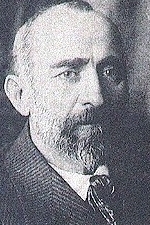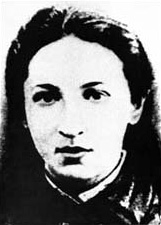<Back to Index>
- Georgian Menshevik Leader Nikoloz "Karlo" Chkheidze, 1864
- Writer and Revolutionary Vera Ivanovna Zasulich, 1849
PAGE SPONSOR

Nikoloz Chkheidze (Georgian: ნიკოლოზ ჩხეიძე; transliterated Russian: Nikolay Semyonovich Chkheidze, commonly known as Karlo Chkheidze; 1864 – June 13, 1926) was a Georgian Menshevik politician who helped to introduce Marxism to Georgia in the 1890s and played a prominent role in the Russian and Georgian revolutions of 1917 and 1918.
Chkheidze was born into an aristocratic family in Puti, a village in the Imereti province of Georgia. With his brother Kalenike Chkheidze, he became in 1892 one of the founders of the first Georgian Social Democratic group, Mesame Dasi (translated literally, the "Third Team"). From 1907 to 1916, he was the member for Tiflis Gubernyia in the Russian State Duma and gained popularity as a spokesman for the Menshevik faction within the Russian Social Democratic Labor Party.
In 1917, the year of the Russian Revolution, Chkheidze became Chairman of the Petrograd Soviet, but failed in his attempt to prevent the rise of a more radical Bolshevism. Although he refused a post in the Russian Provisional Government, he supported its policies and advocated the idea of the "revolutionary oboronchestvo".
When in October 1917 the Bolsheviks seized power in Russia, Chkheidze was on holiday, visiting his native Georgia. Remaining in Georgia, he became leader of the Transcaucasian Sejm on February 23, 1918 and in May was elected a Chairman of the Constituent Assembly of the newly proclaimed Democratic Republic of Georgia. As its representative during the 1919 Versailles Conference, he tried to gain the Entente's support for the new Georgian Republic, but was unsuccessful.
Chkheidze was one of the authors of the Republic's first constitution
in early 1921, but, like others, he was forced into exile when the
Bolsheviks took control of the country in March. He escaped to France, where he lived until committing suicide on June 13, 1926.

Vera Ivanovna Zasulich (Russian: Ве́ра Ива́новна Засу́лич; August 8 [O.S. July 27] 1849 – May 8, 1919) was a Russian Marxist writer and revolutionary.
Zasulich was born in Mikhaylovka, Russia, one of four daughters of an impoverished minor noble. When she was 3, her father died and her mother sent her to live with her wealthier relatives, the Mikulich family, in Byakolovo. After graduating from high school in 1866, she moved to St. Petersburg, where she worked as a clerk. Soon she became involved in radical politics and taught literacy classes for factory workers. Her contacts with the Russian revolutionary leader Sergei Nechaev led to her arrest and imprisonment in 1869.
After Zasulich was released in 1873, she settled in Kiev, where she joined the Kievan Insurgents, a revolutionary group of Mikhail Bakunin's anarchist supporters, becoming a respected leader of the movement. As her lifelong friend and fellow revolutionary Lev Deich wrote:
- Because of her intellectual development, and particularly she was so well read, Vera Zasulich was more advanced than the other members of the circle. ... Anyone could see that she was a remarkable young woman. You were struck by her behavior, particularly by the extraordinary sincerity and unaffectedness of her relations with others."
In July 1877, a political prisoner, Alexei Bogolyubov, refused to remove his cap in the presence of Colonel Theodore Trepov, the governor of St. Petersburg famous for his suppression of the Polish rebellions in 1830 and 1863. In retaliation, Trepov ordered that Bogolyubov be flogged, which outraged not only revolutionaries, but also sympathetic members of the intelligentsia. A group of six revolutionaries plotted to kill Trepov, but Zasulich was the first to act. She and her fellow social revolutionary Maria (Masha) Kolenkina were planning to shoot two government representatives, the prosecutor Vladislav Zhelekhovskii in the "trial of the 193" and another enemy of the populist movement; following the Bogolyubov flogging they decided that the second target should be Trepov. Waiting until after the verdict was announced at the Trial of 193, on January 24, 1878 they went for their respective targets. Kolenkina's attempt against Zhelekhovskii failed, but Zasulich using a British Bulldog revolver shot and seriously wounded Trepov.
At her widely publicized trial the sympathetic jury found Zasulich not guilty, an outcome that tested the effectiveness of the judicial reform of Alexander II. On one interpretation it demonstrated the courts' ability to stand up to the authorities. However Zasulich had a very good lawyer, who turned the case on its head so that it "very soon became obvious that it was Colonel Trepov rather than his would be assassin who was really being tried". That Trepov and the government now appeared as the guilty party demonstrated ineffectiveness in both the courts and the government.
Fleeing before she could be rearrested and retried, Zasulich became a hero to populists and the radical part of the Russian society. Despite her previous record, she was against the terror campaign that would eventually lead to the assassination of Tsar Alexander II in 1881.
After the trial had been annulled, Zasulich fled to Switzerland, where
she converted to Marxism and co-founded the Emancipation of Labor group
with Georgi Plekhanov and Pavel Axelrod in 1883. The group commissioned
Zasulich to translate a number of Karl Marx's works into Russian,
which contributed to the growth of Marxist influence among Russian
intellectuals in the 1880s and 1890s and was one of the factors that led
to the creation of the Russian Social Democratic Labor Party
(RSDLP) in 1898. In mid 1900, the leaders of the radical wing of the
new generation of Russian Marxists, Julius Martov, Vladimir Lenin and
Alexander Potresov, joined Zasulich, Plekhanov and Axelrod in
Switzerland. In spite of the tensions between the two groups, the six
founded Iskra,
a revolutionary Marxist newspaper, and formed its editorial board. They
were opposed to the more moderate Russian Marxists (known as
"economists") as well as ex-Marxists like Peter Struve and Sergei Bulgakov and spent much of 1900 - 1903 debating them in Iskra.
The Iskra editors were successful in convening a pro - Iskra Second Congress of the RSDLP in Brussels and London in 1903. However, Iskra supporters unexpectedly split during the Congress and formed two factions, Lenin's Bolsheviks and Martov's Mensheviks, Zasulich siding with the latter. She returned to Russia after the 1905 Revolution, but her interest in revolutionary politics waned. She supported the Russian war effort during World War I and opposed the October Revolution of 1917. She died in Petrograd on May 8, 1919.
In his book Lenin, Leon Trotsky, who was friendly with Zasulich in London in 1903, wrote:
- Sasulich was a curious person and a curiously attractive one. She wrote very slowly and suffered actual tortures of creation... "Vera Ivanovna does not write, she puts mosaic together, Vladimir Ilyich [Lenin] said to me at that time", And in fact she put down each sentence separately, walked up and down the room slowly, shuffled about in her slippers, smoked constantly hand made cigarettes and threw the stubs and half - smoked cigarettes in every direction on all the window seats and tables, and scattered ashes over her jacket, hands, manuscripts, tea in the glass, and incidentally her visitor. She remained to the end the old radical intellectual on whom fate grafted Marxism. Sasulich's articles show that she had adopted to a remarkable degree the theoretic elements of Marxism. But the moral political foundations of the Russian radicals of the '70s remained untouched in her until her death.